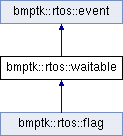 |
Bare Metal Programming Tool Kit
|
 |
Bare Metal Programming Tool Kit
|
abstract thing that a task can wait for More...
#include <rtos.h>

Public Member Functions | |
| virtual void | clear () |
| clear the waitable | |
 Public Member Functions inherited from bmptk::rtos::event Public Member Functions inherited from bmptk::rtos::event | |
| void | print (std::ostream &s, bool header) const |
| prints an event, for debugging only | |
| bool | operator== (const event &rhs) const |
| report wether two events are the same | |
| bool | operator== (const waitable &rhs) const |
| report whether an event corresponds to a waitable | |
| bool | operator!= (const event &rhs) const |
| report wether two events are not the same | |
| bool | operator!= (const waitable &rhs) const |
| report whether an event does not correspond to a waitable | |
| event | operator+ (const event &rhs) const |
| add two waitables, result can be used in a wait() call | |
Protected Member Functions | |
| waitable (task *task, const char *name) | |
| constructor, specify owner and name | |
| void | set () |
| set the waitable | |
Friends | |
| class | waitable_set |
abstract thing that a task can wait for
Waitable is an abstract class (there are no objects that are just a waitable). flag, timer, clock and channel are concrete classes that inherit from waitable. A waitable is always created for a particular task. A maximum of 31 waitables can be created for each task. (Actually the maximum is 32, but one waitable is created internally to implement the rtos-version of the wait() call.) A waitable can be two states: set or cleared. A waitable is initially cleared.
A task can wait for one, a subset, or all waitables created for it. The default is to wait for all waitables created for the task, the other variants are specified by supplying to the task:wait() call either a single waitable, or the sum (operator+) of the waitables you want to wait for. When one of the waitables that is waited for is or becomes set the wait() call clears that waitable and returns an event that compares equal to the waitable. (Note that some waitables, for instance the channel, can immediately set itself again.) The calling task can compare that event to the waitables to see which event happened. When more than one of the waited-for waitables is set the wait() call makes an arbitrary choice from these waitables.
The operation clear() is provided (virtual, the default only clears the waitable) set() is provided but private (not all waitables can be set by the user).
|
protected |
constructor, specify owner and name
The name is used for debugging only.
|
virtual |
clear the waitable
This is automatically done when the waitable causes a task::wait() call to return it.
 1.8.2
1.8.2